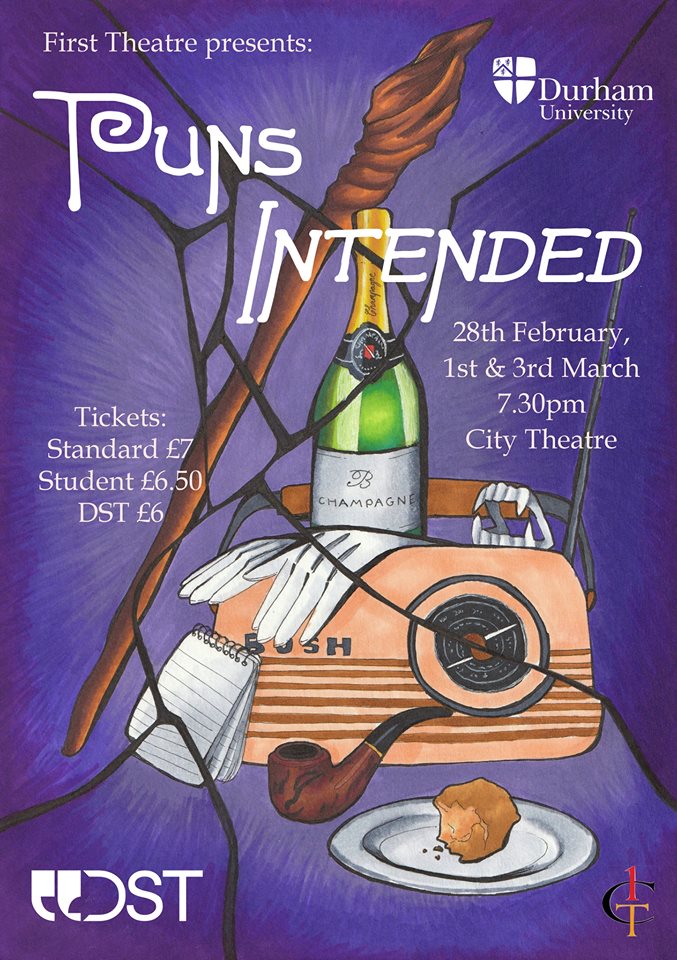Puns Intended, written and directed by Janina Arndt, is an original play featuring some of literature’s most renowned figures; an exciting idea, but one that slightly failed to deliver.
The production starts with a conversation between Shakespeare’s Hamlet and Fitzgerald’s Gatsby about the nature of humans and literary characters. Intended to explain the play, the scene merely confused the audience, as they watched Hamlet steadily getting drunk on Gatsby’s champagne. This was followed by Tolkien and Austen’s characters going on a bizarre quest through literary time in search of a Hobbit (Zoe Rucker). Encountering Dracula on the way, they eventually find her and gather with the rest of the characters in a modern-day café. Sherlock Holmes makes an unexpected appearance for no apparent reason, and deduces that they must be in a play. The production ends with the actors chaotically interacting with the audience in search of the playwright. While the plot lacks some clarity, the deliberate puns are enjoyable to an extent.
By far the best scene was the interaction of the Siren with the Waitress. Played by Christina Williams and Megan Dunnico respectively, the two managed to show an entertaining argument regarding the Siren’s lack of a fishtail – a clever twist from Arndt, contrasting ancient mythology and modern-day interpretations of mermaids and sirens. The comedy was heightened by Williams’ out-of-tune singing – intended – as she tries to seduce Hamlet, played by Sean Alcock. Though his portrayal of Shakespeare’s character somewhat lacked depth, his jokes about the quality of the play humoured the audience whilst the rest of the cast attempted to carry out a quick scene-change. This could have been smoother – the Hobbit and Gandalf struggled with the backdrop, whilst Wilde’s character was completely obscured by the props on the table. Nonetheless, Aaron Rozanski’s Sherlock Holmes made up for these mishaps – the volume and clarity of his speech made him one of the stand-out actors of the production. Likewise, Jack Forber – Gandalf – had excellent diction in spite of the long beard covering his face.
If only the same could be said about the actor playing Stoker’s Dracula; though his fake vampire teeth were meant to be a comedic device, this was unsuccessful. It was more frustrating than funny, trying to make out what the actor was saying as his speech was obscured. Moreover, the character’s desperate attempts to woo first Austen’s, then Wilde’s characters were mediocre, and was not as well-received by the audience as it could have been. Whilst the movements of Nate John and Zoe Rucker – Gatsby and the Hobbit- were convincing, they lacked emotional versatility and a change of tone in their speech; their characters came out rather flat in places as a result. Though not as flat as the pun on The Importance of Being Earnest between Fitzgerald and Wilde’s characters; maintained throughout the entire production, the ‘Earnest’ joke was mentioned at least six times. This was uninspired and overplayed.
It is not clear, whether Hamlet’s question on the nature of writing – hard to even recall by the end – is answered. Nor is it apparent what the whole point of the plot was; the play descends into disarray somewhat. One must commend Arndt on her ideas, for they were inspired, but not the structure, nor the comedy of the production. Whilst the puns were intended, some failed to deliver the desired laughs.

